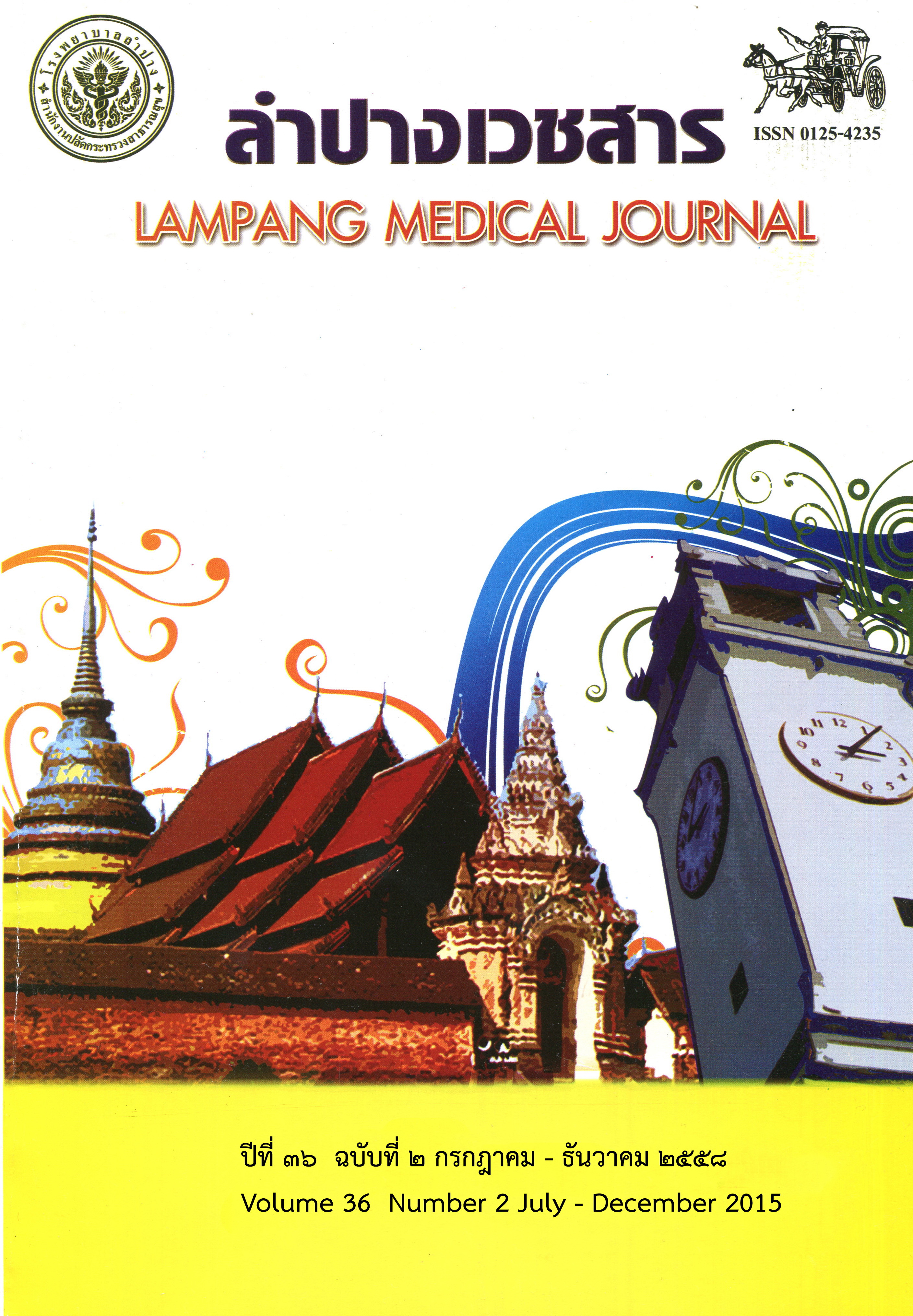Use of Paracetamol to Minimize Pain during Second Trimester Amniocentesis: a Randomized Controlled Trial
Main Article Content
Abstract
Background: Mid-trimester amniocentesis is a routine invasive procedure that offered for the prenatal detection of genetic disease. The role of analgesia during the procedure remains unclear.
Objective: To assess the effectiveness of paracetamol to decrease pain perception during second trimester amniocentesis.
Material and method: A double-blind randomized controlled trial was conducted on pregnant women who underwent second trimester genetic amniocentesis in Lampang Hospital between October 2014 and April 2015. They were equally randomized to receive either oral paracetamol
1,000 mg or placebo 30 minutes prior to amniocentesis. Maternal anticipated and actual pain before and after amniocentesis were assessed by visual analog score. Comparison between groups were analyzed by using Fisher’s exact probability test, student t-test and rank sum test.
Results: Eighty women enrolled the study. Anticipated pain before amniocentesis was 7.2 ± 2.2 in paracetamol group and 6.8 ± 1.9 in placebo group (p=0.304). Actual pain was 3.2 ± 1.8 in paracetamol group and 3.2 ± 2.0 in placebo group (p=0.953).
Conclusion: There was no difference between paracetamol and placebo for minimizing pain during second trimester amniocentesis.
Article Details
บทความที่ส่งมาลงพิมพ์ต้องไม่เคยพิมพ์หรือกำลังได้รับการพิจารณาตีพิมพ์ในวารสารอื่น เนื้อหาในบทความต้องเป็นผลงานของผู้นิพนธ์เอง ไม่ได้ลอกเลียนหรือตัดทอนจากบทความอื่น โดยไม่ได้รับอนุญาตหรือไม่ได้อ้างอิงอย่างเหมาะสม การแก้ไขหรือให้ข้อมูลเพิ่มเติมแก่กองบรรณาธิการ จะต้องเสร็จสิ้นเป็นที่เรียบร้อยก่อนจะได้รับพิจารณาตีพิมพ์ และบทความที่ตีพิมพ์แล้วเป็นสมบัติ ของลำปางเวชสาร
References
2. Suntornlimsiri W, Naunkeaw K. Clinical correlates of pain with second-trimester genetic amniocentesis. J Med Assoc Thai 2009;92:1567-72.
3. Dadhwal V, Sharma AK, Singh A, Deka D, Mittal S, Kumar G. Clinical correlates of pain and anxiety in prenatal diagnostic procedures. Fetal Diagn Ther 2012;32:190-3.
4. Al RA, Yalvac S, Altar OY, Dolen I. Perceived pain and anxiety before and after amniocentesis among pregnant turkish women. Clin Exp Obstet Gynecol 2009;36:184-6.
5. Harris A, Monga M, Wicklund CA, Robbins-Furman PJ, Strecker MN, Doyle NM, et al. Clinical correlates of pain with amniocentesis. Am J Obstet Gynecol 2004;191:542-5.
6. El-Hage W, Leger J, Delcuze A, Giraudeau B, Perrotin F. Amniocentesis, maternal psychopathology and prenatal representations of attachment: a prospective comparative study. PLoS One 2012;7(7):e41777.
7. Gordon MC, Ventura-Braswell A, Higby K, Ward JA. Does local anesthesia decrease pain perception in women undergoing amniocentesis?. Am J Obstet Gynecol 2007;196(1):55.e1-4.
8. Wax JR, Pinette MG, Carpenter M, Chard R, Blackstone J, Cartin A. Reducing pain with genetic amniocentesis - a randomized trial of subfreezing versus room temperature needles. J Matern Fetal Neonatal Med 2005;18:221-4.
9. Pongrojpaw D, Somprasit C, Chanthasenanont A. The efficacy of lidocaine-prilocaine cream to reduce pain in genetic amniocentesis. J Med Assoc Thai 2007;90:1992-6.
10. Hanprasertpong T, Kor-Anantakul O, Prasartwanakit V, Leetanaporn R, Suntharasaj T, Suwanrath C. Efficacy of cryoanalgesia in decreasing pain during second trimester genetic amniocentesis: a randomized trial. Arch Gynecol Obstet 2012;286:563-6.
11. Rebordosa C, Kogevinas M, Bech BH, Sorensen HT, Olsen J. Use of acetaminophen during pregnancy and risk of adverse pregnancy outcomes. Int J Epidemiol 2009;38:706-14.
12. Babb M, Koren G, Einarson A. Treating pain during pregnancy. Can Fam Physician 2010;56:25- 7.
13. Lekskul N, Tannirandorn Y. The location of needle insertion effect on maternal pain in amniocentesis. J Med Assoc Thai 2006; 89(Suppl 4): S137-41.


